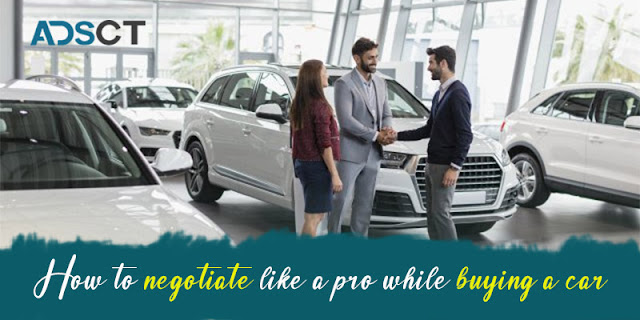How to negotiate like a pro while buying a car
Bidding for a new vehicle can be
amusing as if you're competing as inexperienced against a squad of experts.
However, you could have fair competition by establishing terms and conditions
early on. You can search for cars for sale in Melbourne to get to know about any automotive repairs near you (me). This would give a basic idea and
info so that you can prepare your bid.
Play from your strongest points while
negotiating:
- The
beginning bid is dependent on the dealer's purchase cost whatever you've
determined to be a reasonable price.
- Bids
from those other nearby showrooms or automotive websites that are
competing with yours.
The salesperson will most likely
start by discussing the car's MSRP (Manufacturer's Suggested Retail Price) or
the down payment. Don't go down that road.
Once he begins with pricing,
start at the bottom and then gradually build up, not from MSRP. The dealer
might clump the process flow together by commencing with your monthly bill as
the focal point: the cost of the new car, the barter, and, if applicable,
financing. This allows him far too much room to create havoc.
Nevertheless, emphasis is on
tackling one issue at a time. The first objective should be to find the best
deal on a new automobile. One should only start talking about a transfer or
finance after they've secured it.
Establish the Ground Rules
Rather than delving deep into an
argument about the salesperson's terminology, tell her:
- You've
done your research but already took a test drive in the car you desire.
- When
knowing exactly what trim level and extras you need, you've done your
research on the cost of that arrangement, and you pretty much know how
much the dealership spent on it.
- You've
obviously estimated how much you're willing to pay. Assuage the
salesperson's fears by assuring them that your offer includes a reasonable
profit margin.
- You'll
be ready to purchase right away if somehow the salesperson can match your
desired price; or else, you'll be considering other options.
Come to the point:
Begin the discussions with a reasonable bid that you've estimated ahead of time. Your proposal must be based on an average transaction value for the type and customization level(s) you're interested in purchasing. It establishes a benchmark over what others in your neighbourhood are prepared to spend on a car. The dealer invoice has lost a lot of its relevance, and it no longer reflects the effect of market forces, which is a key factor in the marketplace.
Following your original proposal, there is normally a back-and-forth while the salesperson sends your proposals to the sales agent and reappears with competing offers. Expect bids to be considerably higher than your goal value. Also, end up waiting several minutes between every step.
Make an effort to not be argumentative. Rather than accepting the dealer's counterproposal and banging it down, continue working from the lower amount, increasing it a little at a time.
Keep your composure and stand firm:
The first response of a
salesperson could be contemptuous. They might state categorically that the
manager will not allow the car to be bought at your pricing. He might even try
to persuade you that your calculations are incorrect. Provide a hard copy of
all information sources if this is the case.
He may oppose your proposal with
a bombardment of arguments, pleadings, and ploys to persuade you to increase
your price, even when he can't seem to find anything wrong with your figures.
However, make it apparent that you will not have a lot more time to wait. You
have considerable leeway as well. And besides, you calculated a price point
that accounted for a modest dealer gain.
When to Depart:
If the conversation becomes
stalled, and the dealership's proposal is still nowhere near how much you can
accept, it may well be better to call it a day. If you are confronted with
these practices, you should seek out yet another supplier.
When is it OK to say yes:
If a price falls within your
price bracket, you should certainly accept that and move on to the trade-in and
financing procedures.
You Can Now Discuss Trade-Ins:
You should only start thinking
about the barter once you've agreed on a cost for the new vehicle. You already
know what you can get for it if you've toured it to several dealers. With this
info, there's really no reason why a dealer shouldn't provide you with at least
the market worth of your vehicle as a trade-in agreement.


Comments
Post a Comment